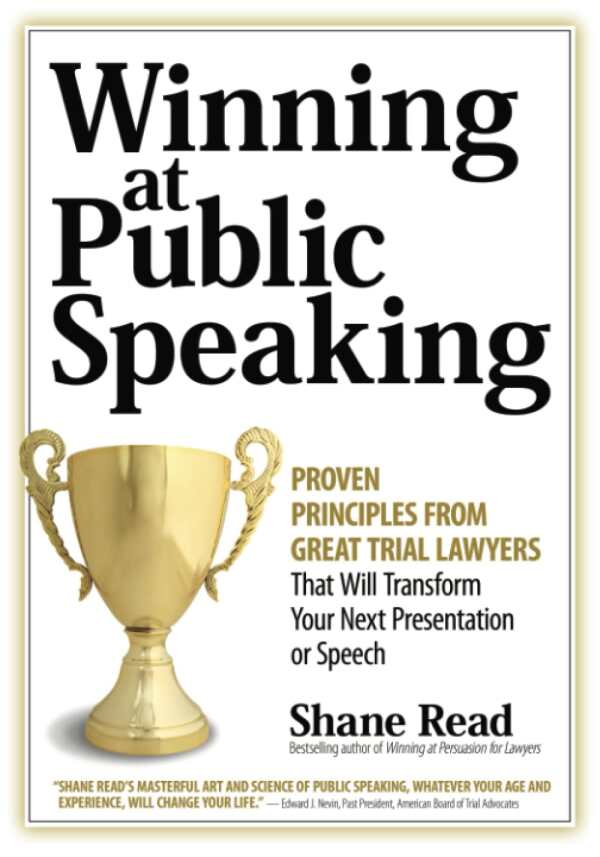Winning at Public Speaking
Proven Principles from Great Trial Lawyers That Will Transform Your Next Presentation or Speech
The career guide Winning at Public Speaking is filled with practical advice for delivering confident and persuasive arguments.
Directed at lawyers, Shane Read’s career guide Winning at Public Speaking suggests ways of connecting to clients and courtrooms.
An introvert who himself had to learn how to communicate effectively in court, Read begins his book with general advice for overcoming the common fear of speaking in public. The book shares seven tips for approaching public speaking tasks. These include treating each speech like a conversation, developing good listening skills, and knowing how to tell an interesting story.
The book’s organization is progressive to further help people develop their public speaking skills. It moves from its widely applicable advice toward law-specific guidance that turns its early theories toward reality-based examples, as of how attorneys should lay their cases out for juries, in terms of narratives, clear presentations, and oratory style. Detailed, in-depth explorations of actual cases give such suggestions weight.
Indeed, the book’s analyses of notable public speakers and cases, covering a range from Aristotle to a case against Johnson & Johnson over the effects of baby powder, are used to illustrate Read’s points throughout. Its anecdotes about public speakers represent a usefully wide range, mixing historical context with examples of best practices. And its prose is persuasive and conversational, trading between practical advice (such as to drink a cup of water before speaking) and philosophical encouragements (as with a suggestion that most people in any audience will take a supportive listening posture).
Taken together, these suggestions represent a coherent strategy for approaching public speaking engagements—both those related to legal matters and those outside of the courtroom. Read ably demystifies lawyers’ methods of preparation prior to making presentations in court, resulting in a sense of applied theory and relevance. Reading guides and book suggestions are present to further support the audience in their endeavors.
While some of the book’s advice is common sense, including exhortations to remember to breathe, it carries the weight of Read’s lived experiences—he’s someone who, despite his reticence to speak publicly, still found the right strategies to make successful arguments in front of others. Still, the book’s use of quotations becomes repetitive; it leans too much on the wisdom of notable speakers, including authors and presidents, regarding the challenges associated with public speaking.
Written for lawyers in particular, Winning at Public Speaking is filled with practical advice for delivering confident and persuasive arguments.
Reviewed by
Jeremiah Rood
Disclosure: This article is not an endorsement, but a review. The publisher of this book provided free copies of the book and paid a small fee to have their book reviewed by a professional reviewer. Foreword Reviews and Clarion Reviews make no guarantee that the publisher will receive a positive review. Foreword Magazine, Inc. is disclosing this in accordance with the Federal Trade Commission’s 16 CFR, Part 255.

